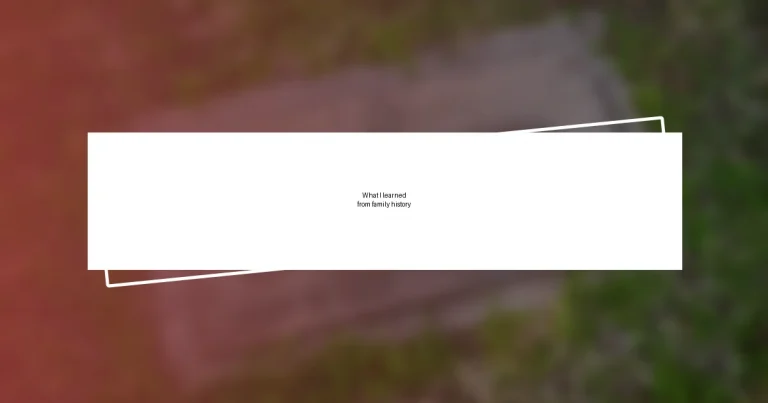Key takeaways:
- Exploring family history fosters a sense of belonging and strengthens intergenerational bonds through shared stories and memories.
- Effective methods for researching family history include interviews, online databases, cemetery visits, DNA testing, and engaging with historical societies.
- Documenting family stories with tools like journals and audio recordings helps preserve emotions and personal narratives for future generations.
- Family traditions serve as bridges to our past, enriching our identities and reminding us of shared values and resilience inherited from ancestors.

Understanding family history benefits
Understanding family history can be a profound experience. When I first delved into my family’s past, I uncovered stories of resilience and courage that shaped who I am today. It made me wonder, how many lessons lie hidden in our ancestors’ journeys waiting to inspire us?
One of the most rewarding benefits of exploring family history is the sense of belonging it creates. I remember sitting with my grandmother and looking at old photographs; each picture came alive with tales of adventure and hardship. It struck me that understanding where we come from can ground us, especially during times of uncertainty—like a sturdy tree whose roots keep it upright amidst the winds of change.
Additionally, tracing family roots can forge stronger bonds among generations. Sharing discoveries with my younger relatives sparked enthusiastic conversations, bridging generations in a way I never anticipated. Have you ever experienced that joy in connecting with family over shared memories? It reminds us that our legacies connect us in ways that go beyond time and distance.

Methods for researching family history
When I took my first steps into researching my family history, I quickly realized there are several effective methods to guide the journey. One of my favorites has been talking to family members. I remember gathering around the kitchen table with my uncle, who shared tales about our ancestors that I had never heard before. Those conversations often sparked my curiosity, leading me to dig deeper into specific branches of our family tree.
Here are some tried-and-true methods for researching family history:
- Interviews: Speak with relatives to capture stories, memories, and insights about your family’s past.
- Online databases: Utilize platforms like Ancestry.com or FamilySearch.org to access historical records and family trees.
- Cemeteries & Archives: Visit local cemeteries and libraries, where you might uncover birth, marriage, and death records.
- DNA Testing: Consider taking a DNA test to discover genetic connections and potentially find unknown relatives.
- Historical Societies: Engage with local historical societies; they often have valuable resources specific to the area your family came from.
I still remember those moments vividly. Each piece of information was like a puzzle, slowly revealing the bigger picture of who we are. It’s about piecing together not just names and dates, but stories and memories that enrich our lives today.

Tools for documenting family stories
When it comes to documenting family stories, having the right tools can make all the difference. I’ve found that keeping a journal dedicated to family history allows me to write down not just facts but the emotions tied to memories. It’s like crafting a living document that grows with me, filled with handwritten anecdotes and reflections that bring my family’s past into vivid focus.
Technology also plays a crucial role in capturing these stories. For instance, I recently started using audio recording apps to interview my relatives. There’s something incredibly powerful about hearing their voices while they share their experiences—it’s as if I’m holding a piece of history in my hands. Plus, these recordings can be easily saved and shared, ensuring those stories remain alive for future generations.
To help visualize all these tools, consider the following comparison table:
| Tool | Description |
|---|---|
| Journals | Personal documentation of stories and reflections. |
| Audio Recorders | Captures voices and stories directly from relatives. |
| Family Tree Software | Organizes family lineage and connections visually. |
| Photography | Preserves visual memories and enhances storytelling. |
| Online Platforms | Accesses vast databases for historical records. |

Learning from family traditions
Learning from family traditions has been a deeply enriching experience for me. Celebrating certain holidays, for instance, always brought vivid memories of my grandparents preparing traditional recipes passed down through generations. I often wonder how such practices can shape our identities. Engaging in these rituals allows me to appreciate the values and stories they carry—values like togetherness and resilience.
A powerful moment for me was when my family gathered for a reunion. I participated in a storytelling circle, where each relative shared what our family traditions meant to them. Listening to my cousin talk about how our great-grandfather’s fishing trips instilled a love for nature in him made me reflect on how our backgrounds intertwine with who we are today. Isn’t it fascinating how one tradition can inspire different paths in life?
Reflecting on these experiences, I realize family traditions are more than just routines; they’re bridges connecting us to our past. Whether it’s lighting candles for a particular celebration or honoring our ancestors with rituals, these acts have taught me the importance of remembrance. They create a sense of belonging that is hard to put into words, yet it profoundly influences how I view my place in the world.

Connecting with relatives through history
Connecting with relatives through history has opened my eyes to how intertwined our lives really are. I remember a time when my cousin and I sifted through old family albums, each photo sparking stories that revealed our little-known connections. It was a revelation to see how our ancestors’ choices shaped not just their lives but ours as well; it made me wonder how many other hidden tales are waiting to be discovered within our family history.
One memorable afternoon, I arranged a virtual gathering with my relatives from different parts of the country. We chose a theme around our family’s migration story. As each person shared their version, I felt a shared pulse of connection. Listening to my aunt recount the challenges faced by our forebears as they journeyed to a new land was not just informative; it was emotional. I could feel the strength they passed down through the generations, making me realize how their resilience lives on in us today—how often do we really think about the sacrifices made by those who came before?
Reflecting on these connections, I’ve learned that every story holds a lesson, waiting to deepen our familial bonds. They’re like threads in a tapestry, weaving us all together. For instance, I’ve started to see how my own career choices echo those of my grandparents, who took risks for better opportunities. Isn’t it interesting how our aspirations can often mirror the dreams of those who came before us? It’s as if history whispers through our choices, nudging us toward a path that can honor their legacy while forging our own.

Sharing insights from family research
Sharing insights from family research has truly revealed the layers of our shared history. I still remember the day I discovered a box filled with letters from my great-grandmother to her sister. Reading those heartfelt words was like stepping back in time; I could feel her hopes, dreams, and fears leap off the page. Each letter told a piece of her story that had been nearly forgotten, making me ponder how easily we overlook the voices of those who came before us.
While digging deeper into the family tree, I stumbled upon a stunning surprise: a relative I never knew existed who had made quite an impact during a historical event. This discovery sent me down a rabbit hole of research, and I felt an exhilarating mix of pride and curiosity. It’s incredible to think that a part of my identity has roots in activism—I often ask myself, how much do our ancestors influence who we become? Their legacies seem to pulse through my veins, igniting a passion for advocacy that I might not have recognized otherwise.
As I continued to piece together our family’s narrative, I realized that each insight I gained enriches not just my understanding of our past but also informs my future. I’ve begun incorporating these newfound perspectives into my everyday life. For instance, when I face challenges, I remind myself of the strength and determination shown by my ancestors. Isn’t it remarkable how their experiences guide us? In many ways, my journey of uncovering these insights has become a source of inspiration—a continual reminder that our family stories don’t just belong in the past; they live on within us, shaping our paths forward.














